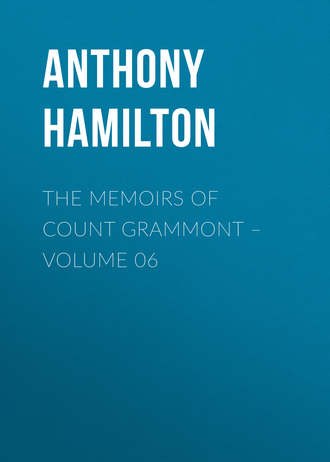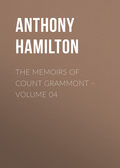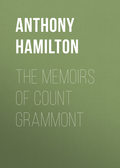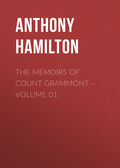
Anthony Hamilton
The Memoirs of Count Grammont – Volume 06
But, instead of approaching nearer the court, he retreated into one of the most obscure corners of the city: where, again changing both his name and his dress, in order to act a new part, he caused bills to be dispersed, giving notice of "The recent arrival of a famous German doctor, who, by long application and experience, had found out wonderful secrets, and infallible remedies."
[Bishop Burnet confirms this account. – "Being under an unlucky accident, which obliged him to keep out of the way, he disguised himself so, that his nearest friends could not have known him, and set up in Tower Street for an Italian mountebank, where he practised physic for some weeks, not without success. In his latter years he read books of history more. He took pleasure to disguise himself as a porter, or as a beggar; sometimes to follow some mean amours, which, for the variety of them, he affected. At other times, merely for diversion, he would go about in odd shapes; in which he acted his part so naturally, that even those who were in the secret, and saw him in these shapes, could perceive nothing by which he might be discovered." – Burnet's Life of Rochester, ed. 1774, p. 14.]
His secrets consisted in knowing what was past, and foretelling what was to come, by the assistance of astrology: and the virtue of his remedies principally consisted in giving present relief to unfortunate young women in all manner of diseases, and all kinds of accidents incident to the fair sex, either from too unbounded charity to their neighbours, or too great indulgence to themselves.
His first practice being confined to his neighbourhood, was not very considerable; but his reputation soon extending to the other end of the town, there presently flocked to him the women attending on the court, next, the chamber-maids of ladies of quality, who, upon the wonders they related concerning the German doctor, were soon followed by some of their mistresses.
Among all the compositions of a ludicrous and satirical kind, there never existed any that could be compared to those of Lord Rochester, either for humour, fire, or wit; but, of all his works, the most ingenious and entertaining is that which contains a detail of the intrigues and adventures in which he was engaged while he professed medicine and astrology in the suburbs of London.
The fair Jennings was very near getting a place in this collection; but the adventure that prevented her from it, did not, however, conceal from the public her intention of paying a visit to the German doctor.
The first chamber-maids that consulted him were only those of the maids of honour; who had numberless questions to ask, and not a few doubts to be resolved, both upon their own and their mistresses' accounts. Notwithstanding their disguise, he recognised some of them, particularly Miss Temple's and Miss Price's maids, and her whom Miss Hobart had lately discarded: these creatures all returned either filled with wonder and amazement, or petrified with terror and fear. Miss Temple's chamber-maid deposed that he assured her she would have the small-pox, and her mistress the great, within two months at farthest, if her aforesaid mistress did not guard against a man in woman's clothes. Miss Price's woman affirmed that, without knowing her, and only looking in her hand, he told her at first sight that, according to the course of the stars, he perceived that she was in the service of some good-natured lady, who had no other fault than loving wine and men. In short, every one of them, struck with some particular circumstance relating to their own private affairs, had either alarmed or diverted their mistresses with the account, not failing, according to custom, to embellish the truth, in order to enhance the wonder.
Miss Price, relating these circumstances one day to her new friend, the devil immediately tempted her to go in person, and see what sort of a creature this new magician was. This enterprise was certainly very rash; but nothing was too rash for Miss Jennings, who was of opinion that a woman might despise appearances, provided she was in reality virtuous. Miss Price was all compliance, and thus having fixed upon this glorious resolution, they only thought of the proper means of putting it into execution.
It was very difficult for Miss Jennings to disguise herself, on account of her excessive fair and bright complexion, and of something particular in her air and manner: however, after having well considered the matter the best disguise they could think of was to dress themselves like orange girls.
[These frolics appear to have been not unfrequent with persons of high rank at this period. In a letter from Mr. Henshaw to Sir Robert Paston, afterwards Earl of Yarmouth, dated October 13, 1670, we have the following account: "Last week, there being a faire neare Audley-end, the queen, the Dutchess of Richmond, and the Dutchess of Buckingham, had a frolick to disguise themselves like country lasses, to red petticoats, wastcotes, &c., and so goe see the faire. Sir Barnard Gascoign, on a cart jade, rode before the queen; another stranger before the Dutchess of Buckingham; and Mr. Roper before Richmond. They had all so overdone it in their disguise, and looked so much more like antiques than country volk, that, as soon as they came to the faire, the people began to goe after them; but the queen going to a booth, to buy a pair of yellow stockings for her sweet hart, and Sir Bernard asking for a pair of gloves sticht with blew, for his sweet hart, they were soon, by their gebrish, found to be strangers, which drew a bigger flock about them. One amongst them had seen the queen at dinner, knew her, and was proud of her knowledge. This soon brought all the faire into a crowd to stare at the queen. Being thus discovered, they, as soon as they could, got to their horses; but as many of the faire as had horses got up, with their wives, children, sweet harts, or neighbours, behind them, to get as much gape as they could, till they brought them to the court gate. Thus, by ill conduct, was a merry frolick turned into a penance." – I've's Select Papers, p. 39.
Bishop Burnet says, "at this time, (1668) the court fell into much extravagance in masquerading: both the king and queen, all the court, went about masked, and came into houses unknown, and danced there, with a great deal of wild frolic. In all this people were so disguised, that, without being in the secret, none could distinguish them. They were carried about in hackney chairs. Once the queen's chairmen, not knowing who she was, went from her. So she was alone, and was much disturbed, and came to Whitehall in a hackney coach; some say in a cart." – Burnet's History, vol. i., p. 368.]
This was no sooner resolved upon, but it was put in execution they attired themselves alike, and, taking each a basket of oranges under their arms, they embarked in a hackney coach, and committed themselves to fortune, without any other escort than their own caprice and indiscretion.
The duchess was gone to the play with her sister: Miss Jennings had excused herself under pretence of indisposition she was overjoyed at the happy commencement of their adventure; for they had disguised themselves, had crossed the Park, and taken their hackney coach at Whitehall gate, without the least accident. They mutually congratulated each other upon it, and Miss Price, taking a beginning so prosperous as a good omen of their success, asked her companion what they were to do at the fortune-teller's, and what they should propose to him.
Miss Jennings told her that, for her part, curiosity was her principal inducement for going thither; that, however, she was resolved to ask him, without naming any person, why a man, who was in love with a handsome young lady, was not urgent to marry her, since this was in his power to do, and by so doing he would have an opportunity of gratifying his desires. Miss Price told her, smiling, that, without going to the astrologer, nothing was more easy than to explain the enigma, as she herself had almost given her a solution of it in the narrative of the Duchess of Cleveland's adventures.
Having by this time nearly arrived at the playhouse, Miss Price, after a moment's reflection, said, that since fortune favoured them, a fair opportunity was now offered to signalize their courage, which was to go and sell oranges in the very playhouse, in the sight of the duchess and the whole court. The proposal being worthy of the sentiments of the one, and of the vivacity of the other, they immediately alighted, paid off their hack, and, running through the midst of an immense number of coaches, with great difficulty they reached the playhouse door. Sidney, more handsome than the beautiful Adonis, and dressed more gay than usual, alighted just then from his coach: Miss Price went boldly up to him, as he was adjusting his curls; but he was too much occupied with his own dear self to attend to anything else, and so passed on without deigning to give her an answer. Killegrew came next, and the fair Jennings, partly encouraged by the other's pertness, advanced towards him, and offered him her basket, whilst Price, more used to the language, desired him to buy her fine oranges. "Not now," said he, looking at them with attention; "but if thou wilt to-morrow morning bring this young girl to my lodgings, I will make it worth all the oranges in London to thee" and while he thus spoke to the one he chucked the other under the chin, examining her bosom. These familiarities making little Jennings forget the part she was acting, after having pushed him away with all the violence she was able, she told him with indignation that it was very insolent to dare – "Ha! ha!" said he, "here's a rarity indeed! a young w – , who, the better to sell her goods, sets up for virtue, and pretends innocence!"
Price immediately perceived that nothing could be gained by continuing any longer in so dangerous a place; and, taking her companion under the arm, she dragged her away, while she was still in emotion at the insult that had been offered to her.
Miss Jennings, resolving to sell no more oranges on these terms, was tempted to return, without accomplishing the other adventure; but Price having represented to her the disgrace of such cowardly behaviour, more particularly after having before manifested so much resolution, she consented to go and pay the astrologer a short visit, so as they might be enabled to regain the palace before the play was ended.
They had one of the doctor's bills for a direction, but there was no occasion for it; for the driver of the coach they had taken told them he knew very well the place they wanted, for he had already carried above an hundred persons to the German doctor's: they were within half a street of his house, when fortune thought proper to play them a trick.
Brounker had dined by chance with a merchant in that part of the city, and just as he was going away they ordered their coach to stop, as ill-luck would have it, just opposite to him. Two orange girls in a hackney coach, one of whom appeared to have a very pretty face, immediately drew his attention; besides, he had a natural curiosity for such objects.
[Gentleman of the chamber to the Duke of York, and brother to Lord Viscount Brounker, president of the royal society. Lord Clarendon imputes to him the cause of the great sea-fight, in 1665, not being so well improved as it might have been, and adds, "nor did the duke come to hear of it till some years after, when Mr. Brounker's ill course of life, and his abominable nature, had rendered him so odious, that it was taken notice of in parliament, and, upon examination, found to be true, as is here related; upon which he was expelled the house of commons, whereof he was a; member, as an infamous person, though his friend Coventry adhered to him, and used many indirect acts to have protected him, and afterwards procured him to have more countenance from the king than most men thought he deserved; being a person, throughout his whole life, never notorious for anything but the highest degree of impudence, and stooping to the most infamous offices, and playing very well at chess, which preferred him more than the most virtuous qualities could have done." – Continuation of Clarendon's Life, p. 270.]
Of all the men at court, he had the least regard for the fair sex, and the least attention to their reputation: he was not young, nor was his person agreeable; however, with a great deal of wit he had a violent passion for women. He did himself justice respecting his own merit; and, being persuaded that he could only succeed with those who were desirous of having his money, he was at open war with all the rest. He had a little country-house four or five miles from London always well stocked with girls: in other respects he was a very honest man, and the best chess-player in England.
Price, alarmed at being thus closely examined by the most dangerous enemy they could encounter, turned her head the other way, bid her companion do the same, and told the coachman to drive on. Brounker followed them unperceived on foot; and the coach having stopped twenty or thirty yards farther up the street, they alighted. He was just behind them, and formed the same judgment of them which a man much more charitable to the sex must unavoidably have done, concluding that Miss Jennings was a young courtesan upon the look-out, and that Miss Price was the mother-abbess. He was, however, surprised to see them have much better shoes and stockings than women of that rank generally wear, and that the little orange girl, in getting out of a very high coach, showed one of the handsomest legs he had ever seen: but as all this was no obstruction to his designs, he resolved to purchase her at any rate, in order to place her in his seraglio.
He came up to them, as they were giving their baskets in guard to the coachman, with orders to wait for them exactly in that place. Brounker immediately pushed in between them: as soon as they saw him, they gave themselves up for lost; but he, without taking the least notice of their surprise, took Price aside with one hand, and his purse with the other, and began immediately to enter upon business, but was astonished to perceive that she turned away her face, without either answering or looking at him: As this conduct appeared to him unnatural, he stared her full in the face, notwithstanding all her endeavours to prevent him: he did the same to the other: and immediately recognised them, but determined to conceal his discovery.
The old fox possessed a wonderful command of temper on such occasions, and having teazed them a little longer to remove all suspicions he quitted them, telling Price; "That she was a great fool to refuse his offers, and that her girl would not, perhaps, get so much in a year, as she might with him in one day; that the times were greatly changed, since the queen's and the duchess's maids of honour forestalled the market, and were to be had cheaper than the town ladies." Upon this he went back to his coach, whilst they blessed themselves, returning heaven their most hearty thanks for having escaped this danger without being discovered.
Brounker, on the other hand, would not have taken a thousand guineas for this rencounter: he blessed the Lord that he had not alarmed them to such a degree as to frustrate their intention; for he made no doubt but Miss Price had managed some intrigue for Miss Jennings: he therefore immediately concluded, that at present it would be improper to make known his discovery, which would have answered no other end but to have overwhelmed them with confusion.
Upon this account, although Jermyn was one of his best friends, he felt a secret joy in not having prevented his being made a cuckold, before his marriage; and the apprehension he was in of preserving him from that accident, was his sole reason for quitting them with the precautions aforementioned.
Whilst they were under these alarms, their coachman was engaged in a squabble with some blackguard boys, who had gathered round his coach in order to steal the oranges: from words they came to blows: the two nymphs saw the commencement of the fray as they were returning to the coach, after having abandoned the design of going to the fortuneteller's. Their coachman being a man of spirit, it was with great difficulty they could persuade him to leave their oranges to the mob, that they might get off without any further disturbance: having thus regained their hack, after a thousand frights, and after having received an abundant share of the most low and infamous abuse applied to them during the fracas, they at length reached St. James's, vowing never more to go after fortune-tellers, through so many dangers, terrors, and alarms, as they had lately undergone.
Brounker, who, from the indifferent opinion he entertained of the fair sex, would have staked his life that Miss Jennings did not return from this expedition in the same condition she went, kept his thoughts, however, a profound secret; since it would have afforded him the highest satisfaction to have seen the all-fortunate Jermyn marry a little street-walker, who pretended to pass for a pattern of chastity, that he might, the day after his marriage, congratulate him upon his virtuous spouse; but heaven was not disposed to afford him that satisfaction, as will appear in the sequel of these memoirs.
Miss Hamilton was in the country, as we before mentioned, at a relation's: the Chevalier de Grammont bore this short absence of hers with great uneasiness, since she would not allow him permission to visit her there, upon any pretence whatever; but play, which was favourable to him, was no small relief to his extreme impatience.
Miss Hamilton, however, at last returned. Mrs. Wetenhall (for that was the name of her relation) would by all means wait upon her to London, in appearance out of politeness; for ceremony, carried beyond all bearing, is the grand characteristic of country gentry: yet this mark of civility was only a pretence, to obtain a peevish husband's consent to his wife's journey to town. Perhaps he would have done himself the honour of conducting Miss Hamilton up to London, had he not been employed in writing some remarks upon the ecclesiastical history, a work in which he had long been engaged: the ladies were more civil than to interrupt him in his undertaking, and besides, it would entirely have disconcerted all Mrs. Wetenhall's schemes.







